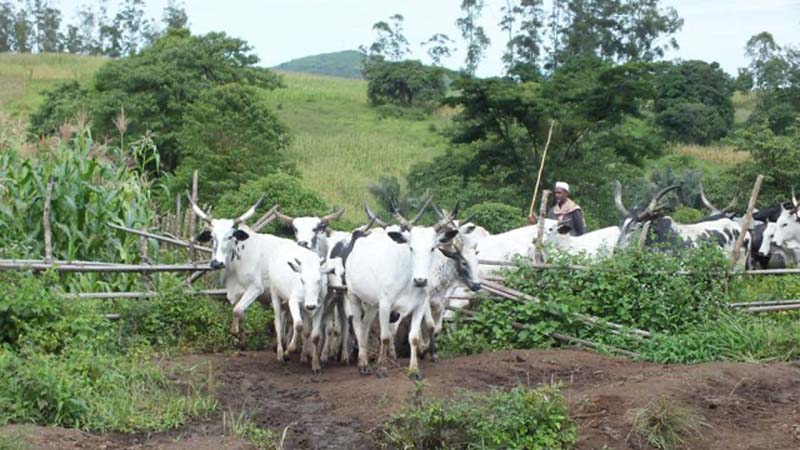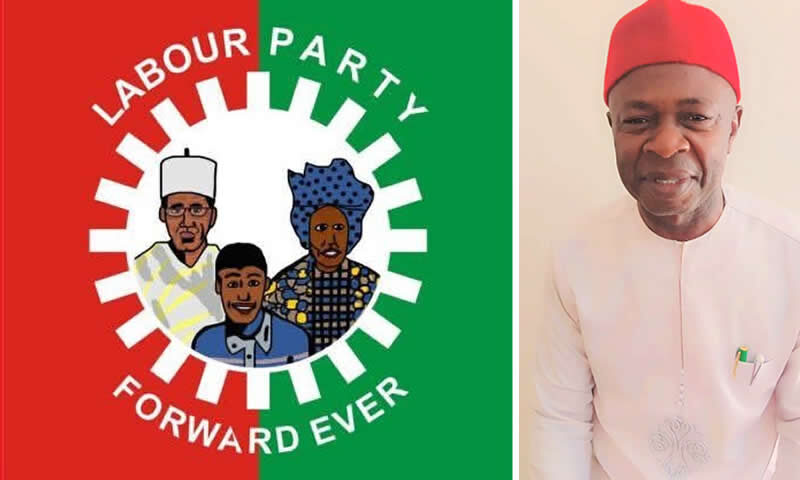The use of GMOs by Western corporations to control the African agricultural production system, and by extension our food sovereignty is another post colonial manipulative thread being waived against our democratic right to choose
The rising cost of food is a multiprong challenge. One of the core issues to curb food insecurity is to manage the physical security of agriculture sector and value chain protecting farmers and their workforce.
The inability to do this has led to frequent killings of farmers, mass murder and scotch earth destruction of farmland and communities by the failed Fulatheid-centric system of Nigeria which has enabled the Fulani herdsmen to exterminate farming communities throughout the whole of Nigeria and leaving the security architecture of the country overwhelmed.
These clashes based on herders leading their livestock across thousands of kilometers of grazing routes to eat up food crops being grown on various farms across the country has left in it’s wake several of thousands farmers dead.
The challenge of having cows roaming the country under the guise of carrying out animal husbandry using grazing routes by herders is archaic, economically pristine and dysfunctional in the digital era of 2024. Buying land and ranching these animals is the simple solutions to cattle rearing and animal husbandry which in itself is a private business and how the Fulani herdsmen need to go about their trade.
Mechanized farming is key to industrializing the farm to fork value chain, which means Government in the long term needs to provide infrastructure as electricity, steel production and also enable homegrown industrial manufacturing of farming machinery and it’s accoutrements which will aid the use of technology to advance agricultural production. The application of space and aerospace technology and infrastructure to manage large scale farming is very key to handling food insecurity and thereby detecting diseases, climate effects on the crops amongst other necessities in achieving a positive agricultural revolution for Nigeria.
The building of infrastructure as silos and cold storage to enable the Fast Moving Consumer Goods (FMCG) value chain so as to handle perishable food crops is key to preserving billions of naira worth of produce and creating products that can be packaged and sold to earn foreign exchange.
Nigeria loses more than $8.9 billion (N2. 7 trillion) annually as a result of post-harvest food losses. In developing countries of which Nigeria is listed, 45% of food spoils mainly due to lack of cold storage. A multi-country study published by Science Direct and carried out by KJ Morris in 2019 estimated food loss in Nigeria to be over 100 kg/capita/year. No doubt such loss in detrimental to food security and sovereignty in the 21 century.
In Nigeria, it has been revealed from studies that a significant quantity of food is lost both before and after storage, with losses of up to 20 to 30% of all grains, 30 to 50% of roots and tubers, and a larger proportion of fruits and vegetables.
A report by the Food and Agriculture Organization (FAO), estimated 14 million tons of food is wasted in Nigeria every year, making it one of the highest contributors to food wastage in Africa. Nigeria’s 60% post-harvest loss creates investment opportunity for investors which is a key sector that needs to be unlocked by FGN policies, security architecture and other ancillary actions to attract sustainable (FDI) investment.
The data shows that post-harvest losses of cassava in Nigeria alone indicate that physical loss was experienced by 95.64% of the respondent, economic loss (93.8%) and monetary loss (97.7%). The causes of cassava post-harvest losses included lack of finance ( =3.56) poor storage ( =3.46) pest and disease infection ( =3.46) inappropriate harvesting time ( =3.40) among others. This is replicable across other food crops and grains. This artificial challenges can and must be reversed by a responsible government through checks by the CSOs, impact Investment and institutional action.
The so called Green Revolution from agroecological processes and use of organic seedlings to the use of genetically modified seedlings (GMOs) like the TELA-Beans which FGN is promoting for release to farmers to be used in Nigeria and advocate by the likes of Gates Foundation and Monsanto has immense adverse implications for the nutrition, health, environment, culture and right to food of Nigerians and all Africans at large. There has been the clamour against Gates Foundation, expressing them to let the continent’s food producers and consumers chart our own paths toward sustainable and healthy farming practices and dietary choices. The first time I met Rhodes-Vivour who ran for Governor of Lagos State in the concluded 2022/23 elections was at a GMO retreat in Apo Abuja to X-ray it’s impact on Nigeria, and the panel had an elite team of MIT scholars who broke down the stark realties alongside himself.
An analysis of the Alliance for the Green Revolution in Africa (AGRA) data by African and German civil society groups clearly establishes that after 14 years of existence with expenditure of over a billion dollars of investment in GMOs, there is no concrete evidence of an increase in income of small-scale producers and no significant enhancement of productivity in the countries that AGRA has been put to the test. The reverse rather is the case with the number of undernourished people increasing significantly by 31%, there has also been adverse environmental impacts to considerable levels with a decline in crop diversity.
The talk of a Green Revolution that enabled India to feed itself has been a ruse, it had its challenges before achieving its outcomes. The evangelised Western science and technology, in the form of seeds modified by science and technology, synthetic fertilizers and pesticides, petroleum-fueled machinery and artificial irrigation are touted to be key to the miracle and that Nigeria like Africa needs to hop on this bandwagon.
The perpetuators of this viewpoint are the 2014 founded Cornell Alliance for Science (CAS) whose job principally it is to “depolarize the charged debate” around genetically modified (GMO) seeds. Given the $22 million in funds received from the Bill and Melinda Gates Foundation, CAS infact preaches in defense of GM seeds, prescribing their healthy qualities, productive and environmentally friendliness, whilst attacking agroecology as economically and socially retrogressive.
On the other hand is the Alliance for Food Sovereignty in Africa (AFSA), which voices for over 200 million farmers, fishers, indigenous peoples, pastoralists, women, consumers and others groups across all but five African countries. AFSA holds firmly that agroecology is the preferred need of the continent. These involve the use of Small-scale, ecofriendly cultivation methods using indigenous knowledge and inputs and cutting-edge science to increase holistic variety, nutritive value and quantity of foods produced on farms while stabilizing rural economies, promoting gender equity, inclusive of protecting biodiversity.
AFSA which is winning is the largest social movement in Africa is pitted again CAS and the Gates Foundation. On June 17, 2021, GRAIN, a small nonprofit organization based in Barcelona, Spain, tracking the foundation’s grant from 2003 to 2020, reported that, the foundation has granted 6 billion USD, 5 billion of which was supposed to serve Africa. The CAS’ disturbing viewpoint, has consistently characterized AFSA’s interpretation of agroecology as “restrictive”. The CAS in it’s far reaching efforts to undermine agroecology has succeeded in undermining support for the paradigm among Africa’s scientists and political leaders. AFSA preaches for farmers’ rights to choose seeds and methods of cultivation, free of corporate interference and control, which is the opposite of the pursuit by the Gates Foundation and CAS who seek to use GMOs as a subterfuge to weaponize the hunger crisis they claim to want to help Africa solve.
Using its Global Leadership Fellows Program, the CAS has trained more than 110 fellows to date, nearly two thirds recruited from Africa across countries where the biotech industry has been seeking regulatory approvals for GMOs; such countries have been Nigeria, Uganda, Kenya and Ghana. In these countries, CAS graduates work have been unleashed like a blitzkrieg on the battlefield within the media and government to argue that African governments should institute investment-friendly policies to help import the GMO technologies that will rescue the continent’s farmers and population from their anachronistic traditions, hunger and poverty. But if you follow the Covid19 plandemic which spinned scientific knowledge on its head, these GMO policy pursuits must never be trusted and be consigned to sustained unacceptability.
CAS fellows promulgate the opinion that Africa’s hunger derives from crop yields being relatively low, with such reasons as first, that seeds bred and shared by farmers are unproductive and that these should be replaced by GMOs. The second thing to remedy is the African farmers do not use enough agrochemicals, and that this deficit need to be catered to. The third viewpoint is, African farmers cultivate a multitude of crops to feed their families and that if they instead focused on growing commodity crops for pan-African and global markets, better yields will be achieved alongside health concerns and nutritional increases.
Another organization funded by the Gates Foundation, the Open Forum on Agriculture Biotechnology (OFAB) which gives support to CAS fellows; ends up narrowing the democratic space for discussion of food systems in Nigeria and African countries. OFAB expresses that opposing points of view are irrational, unscientific and harmful, they often accentuate. OFAB is an offshoot of the African Agricultural Technology Foundation, which was birthed in 2001 to promote GM seeds in Africa between the Rockefeller Foundation and corporations including Monsanto, Dupont, Pioneer and Syngenta. It is evidently clear that these and other connections presuppose that the Gates Foundation’s resources are geared to further the interests of multinational corporations intent on plaguing for profiteership and opening the Nigeria and Africa markets for agrochemicals, synthetic fertilizers and genetically engineered seeds more than they are interested in assisting indigenous farmers.
It is also palpable that in Uganda as an example, the CAS has recruited journalists and key government individuals working on agriculture, science and technology to the cause of promoting GM seeds. Academic fellows there are consistently writing disparaging articles on agroecology, describing it as a “dead end,” and rather promoting biotechnology-based solutions as the preferred pathway. In Nigeria, Alliance fellows work closely with OFAB’s Nigeria Chapter, the National Biotechnology Development Agency, the Nigerian Institute of Public Relations and the Nigerian Institute of Management to advocate for biotechnology, often characterizing it as the only scientific option. The use of GMOs by Western corporations to control the African agricultural production system, and by extension our food sovereignty is another post colonial manipulative thread being waived against our democratic right to choose, as also our life expectancy, sustainability of our nutritional value chains, mortality advantages and competitiveness.
The Nigeria Government must prioritize indigenous research and development (R&D) and reduce the gap between academia and industry especially the food sector by applying enabling policies, impact investment in infrastructure and the agricultural revolution being projected for her to achieve food sovereignty for the people. The use of the platform of the Africa Continental Free Trade Agreement (AfCFTA) is key to ensure African countries irrespective of the colonial borders feeds herself sustainably and breaks completely free from foreign manipulative interference across her food and agricultural systems. The Afro Food Festival comes up in Mozambique .The Afro food festival “Mozambique 2024” is a registered trade mark owned by the Mozambique
Nigeria Chamber of Commerce (CAMOZINI – www.camozini.org) and holds for 5days in April 2024 under the leadership of Dr. Armah Elibe, CEO CAMOZINI and Wayde Clarke, Executive Director – Afro Food Festival Mozambique 2024.
Hon. Minister Ebube George Ebisike is the State Of The African Diaspora (SOAD) Minister Of Trade.






